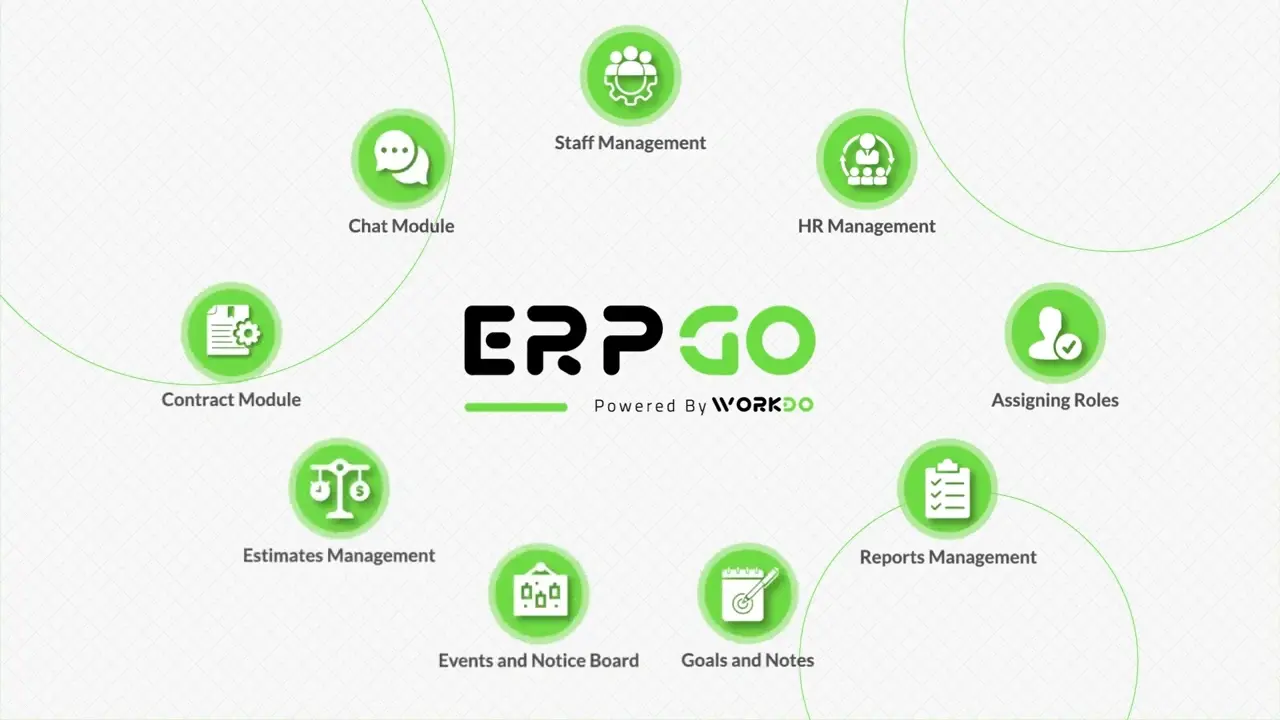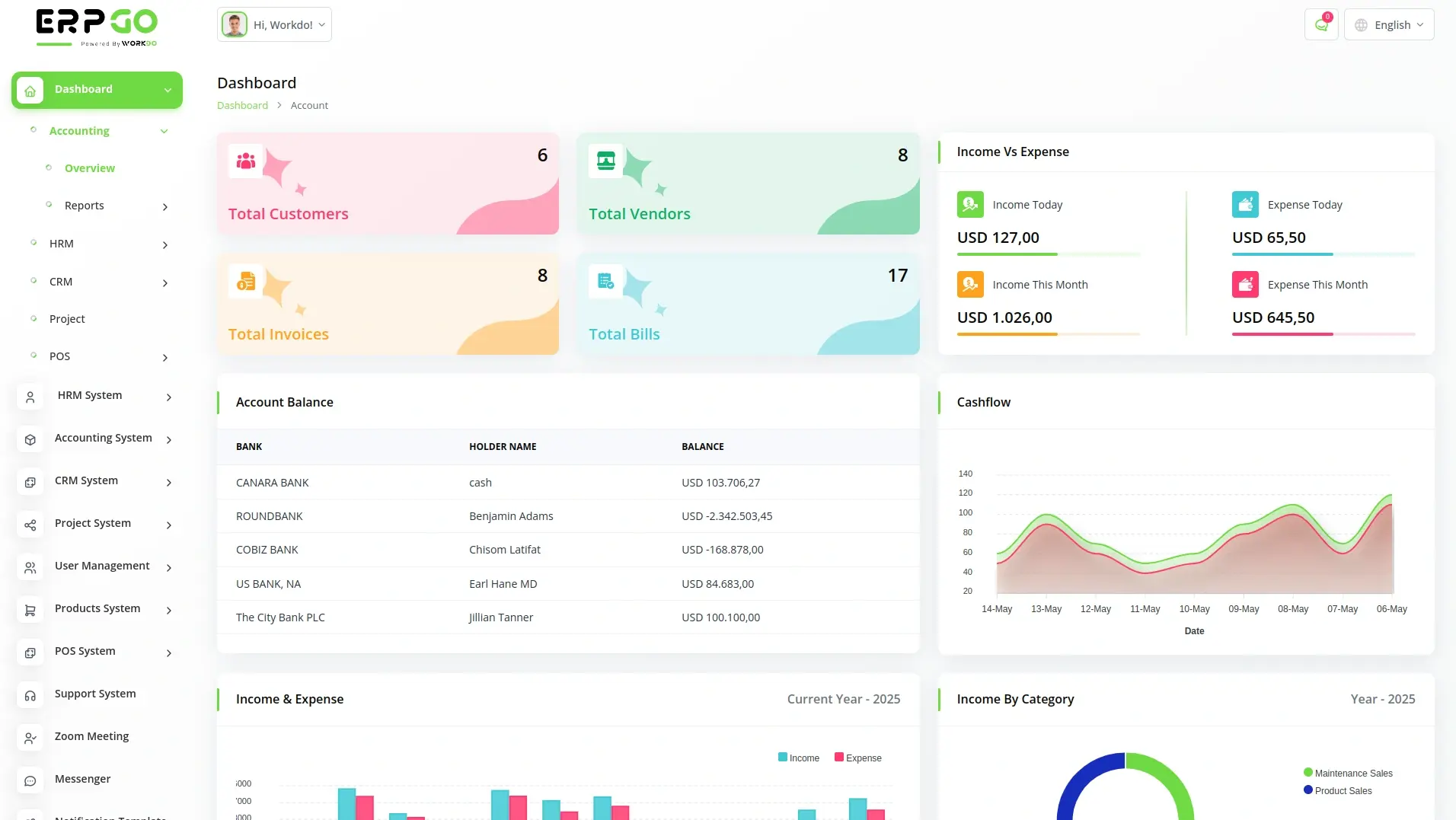A Complete Guide to ERP (Enterprise Resource Planning) Systems
ERP stands for Enterprise Resource Planning—a powerful software system used to manage business operations, from finance and accounting to sales, supply chain, and HR. This guide explains the full form of ERP, its key functions, benefits, tool, types, modules, and real-world examples to help you understand how ERP solutions support modern businesses.
- What is ERP? – Meaning Of ERP And Full Form
- ERP Definition
- What Does ERP Stand For in Software?
- ERP in Business
- ERP Tools and Platforms
- ERP Applications and Modules
- Types of ERP Systems
- ERP in Accounting and Finance
- How Do ERP Systems Work?
- ERP Implementation
- ERP Database and System Architecture
- Examples of ERP Systems and Software
- Benefits of ERP Systems
- Enterprise Resource Managemen System
- ERP Software Development and Custom ERP Solutions
- ERP Concepts and Introduction
- ERP and CRM
- ERP Products and ERP Services in the Market
- What Is an ERP System in Accounting?
- ERP Solution Definition
- Modern ERP Systems
- Why Choose Workdo.io for ERP Solutions?
- Core Features of ERP
- Guide to Building an ERP System
- Frequently Asked Questions
What is ERP? – Meaning Of ERP And Full Form
The sophisticated company management tool known as ERP, or Enterprise Resource Planning, unifies key operations from multiple departments into a single system. The full form of ERP highlights its purpose: Enterprise indicates organization-wide, Resource signifies all operational tools, and Planning reflects strategic use. So, What Is ERP? It’s a solution that connects finance, HR, sales, inventory, and more, helping organizations optimize efficiency.
In simpler terms, the meaning of ERP is a software system designed to manage and automate daily business activities. Companies like WorkDo.io specialize in offering customizable ERP software to streamline operations. To define ERP clearly: it’s a central platform that supports informed decision-making.
ERP Definition – Understanding Enterprise Resource Planning
The definition of ERP extends beyond just software. It represents a strategic approach to enterprise resource planning, allowing businesses to integrate every part of their operations. ERP defined in modern terms means real-time data management, automation, and interconnectivity across teams.
When we define enterprise resource planning, we refer to systems that unify departments like finance, procurement, logistics, and human resources. The ERP abbreviation encapsulates this integration, making ERP essential for digital transformation. WorkDo.io’s ERP platform brings this to life by offering scalable, cloud-based solutions.
What Does ERP Stand For in Software?
In software terms, ERP stands for Enterprise Resource Planning, a term used to describe software that manages all internal business functions within a central system. The ERP full form in software matches its real-world application – it’s about planning enterprise resources through digital platforms.
The full form of ERP software shows how critical it is for business management. ERP software full form is commonly used when companies evaluate digital tools for scaling. For any growing business, understanding what ERP stands for in software is the first step toward innovation.
ERP in Business – Role and Importance of ERP Systems
The role of ERP in business is central. These platforms improve visibility, collaboration, and operational efficiency. So, what is the ERP significance? It lies in reducing manual workloads and errors by digitizing workflows. The enterprise resource planning meaning reflects that ERP enables better productivity and cost control.
In today’s competitive environment, business management ERP systems from WorkDo.io empower leaders with real-time insights. Companies implement ERP to stay agile, meet customer demands, and comply with regulations while driving profits.
ERP Tools and Platforms – What Are ERP Tools Used For?
ERP tools are software components that support specific functions like accounting, CRM, supply chain, or HR. An ERP tool helps repetitive tasks and improve communication across departments. When people ask, “What is ERP tool used for?”—the answer is simple: for managing core business activities.
These ERP platforms integrate analytics, and reporting into a unified interface. With WorkDo.io’s ERP software businesses can customize ERP tools for unique needs, whether in retail, manufacturing, or service industries. Choosing the right ERP tool significantly boosts organizational efficiency.
ERP Applications and Modules – Functional Areas of ERP
ERP applications encompass a wide range of business processes. ERP modules often include finance, inventory, sales, CRM, project management, and HR. Each ERP function operates as a module that interacts with the others for seamless data flow.
Types of ERP Systems – Choose the Right ERP Software
There are various types of ERP systems: on-premise, cloud-based, hybrid, open-source, and industry-specific. Each of these types of enterprise resource planning systems serves a different business model. Companies must select the right ERP software examples that match their scale and industry.
From small startups to global enterprises, the types of ERP systems offered by WorkDo.io’s ERP system can cater to diverse requirements. Whether you need manufacturing, retail, or financial ERP software, there’s a solution tailored for your goals.
ERP in Accounting and Finance – ERP for Financial Management
ERP finance modules manage budgeting, accounting, invoicing, and financial reporting. A robust financial ERP system ensures compliance, accuracy, and transparency. In terms of ERP financial management, automation reduces manual entry and human error.
With ERP and accounting integrated, your business can easily track expenses and revenues in real-time. For organizations wondering about ERP in accounting, WorkDo.io’s ERP software delivers comprehensive financial ERP solutions that ensure fiscal control and scalability.
How Do ERP Systems Work?
ERP systems work by integrating various business processes into a single unified platform, allowing seamless data sharing across departments. Each module within the ERP—such as finance, inventory, human resources, or customer service—connects to a central database. This ensures that data entered in one area (like a new customer order) instantly updates relevant areas like inventory, billing, and shipping.
A typical enterprise resource planning system uses real-time processing to provide immediate access to key metrics, reducing delays and human errors. The ERP system tracks workflows from end to end—whether it’s procurement, production, or payroll. This interconnected structure forms the backbone of modern business management ERP solutions.
WorkDo.io’s ERP systems are designed to work flexibly in the cloud or on-premise, making them scalable for small, medium, or enterprise-level businesses. Thanks to automation, data centralization, and custom modules, ERP systems work to improve decision-making and operational efficiency while reducing redundant tasks.
Whether it’s for financial analysis, supply chain visibility, or HR management, Workdo.io ERP platform ensures all processes stay connected. That’s the true value of how ERP software works in today’s digital landscape.

ERP Implementation – How ERP Systems Are Deployed
ERP implementation involves planning, configuration, data migration, training, and testing. The ERP process varies depending on company size and needs but generally follows a structured rollout strategy. Efficient ERP processes lead to successful adoption and ROI.
ERP modeling allows simulation of workflows before deployment, ensuring alignment with business objectives. With ERP project management tools from Workdo.io, deployment becomes faster and smoother, reducing disruption and maximizing results.
ERP Database and System Architecture
An ERP database is the core data repository that stores all transactional and master data. The structure of ERP systems includes a centralized database, user interface, and integration layers. The ERP system definition encompasses both its software components and infrastructure.
In ERP system development, security, scalability, and speed are key. With WorkDo.io, clients benefit from a robust ERP architecture designed for high performance and modular growth.
Examples of ERP Systems and Software
Popular ERP examples include WorkDo.io’s ERP software like SAP, Oracle, Microsoft Dynamics, and NetSuite. These ERP system examples show how different industries use ERP for supply chain, HR, or finance.
ERP software examples vary by complexity, industry, and budget. Exploring examples of enterprise resource planning systems helps businesses understand available options and make informed decisions.
Benefits of ERP Systems – Why Businesses Need ERP
The benefits of ERP systems include improved efficiency, data accuracy, real-time reporting, cost savings, and regulatory compliance. These benefits of enterprise resource planning empower businesses to make informed decisions quickly.
Companies realize they need ERP to stay competitive. With solutions from WorkDo.io’s ERP software organizations gain flexibility, visibility, and integration—all in one place. The benefits ERP system provides are indispensable for modern business success.
Enterprise Resource Management System – Full Overview
An enterprise resource management system is the foundation of digital business transformation. Planning, monitoring, and enterprise-wide operation optimization tools are included in the enterprise resource management system definition.
With solutions from WorkDo.io’s erp software companies can manage everything—from procurement to payroll—using one centralized platform. These systems ensure that businesses grow with confidence, agility, and insight.

ERP Software Development and Custom ERP Solutions
ERP software development involves creating tailored solutions for unique workflows. Businesses often need a custom ERP software solution to meet industry-specific demands. The ERP solution meaning includes pre-built and bespoke functionalities.
At WorkDo.io, ERP solutions mean more than software—they’re about creating scalable ecosystems. The company offers end-to-end ERP software development with ongoing support and customization.
ERP Concepts and Introduction to Enterprise Resource Planning
Before implementation, understanding the concepts of ERP is essential. An introduction to ERP covers system functions, modules, and business benefits. The introduction to enterprise resource planning builds the foundation for ERP adoption.
These ERP concepts show how integrated systems improve operations. Every concept of ERP presented by WorkDo.io is designed for clarity, usability, and long-term value.
ERP and CRM – ERP CRM Full Form and Integration
ERP and CRM integration helps businesses streamline both back-end operations and front-end customer interactions. The ERP CRM full form— Enterprise Resource Planning and Customer Relationship Management—represents this synergy.
Combining enterprise resource planning and supply chain management allows businesses to end-to-end workflows. WorkDo.io’s ERP software enables this integration seamlessly, improving both operational efficiency and customer satisfaction.
ERP Products and ERP Services in the Market
Modern ERP products include scalable platforms for HR, finance, logistics, and more. ERP services encompass implementation, customization, training, and support. ERP Management ensures ongoing system performance.
WorkDo.io’s ERP software clients receive comprehensive ERP support, from consulting to post-implementation maintenance. The platform offers flexible ERP Products to suit every business size and industry.
What Is an ERP System in Accounting?
Still wondering, what is an ERP system in accounting? It’s a software suite that manages financial data and transactions. By integrating ERP and accounting, businesses streamline tax management, ledgers, and forecasting.
ERP financial systems ensure compliance and improve data accuracy. Workdo.io’s ERP system in accounting brings transparency and automation to all financial activities.
ERP Solution Definition – What is an ERP Solution?
The ERP solution definition refers to comprehensive software that manages all aspects of business operations. When asked, what is ERP solution? — it’s the answer to fragmented systems and inefficiency.
Whether looking for pre-configured software or fully customizable platforms, ERP solutions mean reliable, scalable, and connected systems. WorkDo.io provides ERP solutions tailored to industry needs and growth plans.
Modern ERP Systems – Latest Trends and Features
Modern ERP systems are cloud-based, AI-powered, and mobile-friendly. The ERP modern approach focuses on flexibility, real-time insights, and user experience. A next-gen enterprise resource planning platform must be secure and adaptable.
WorkDo.io’s ERP software stays ahead by integrating cutting-edge technology into its modern ERP offerings, ensuring clients are always prepared for market demands and digital shifts.
🌟 Why Choose Workdo.io for ERP Solutions?
When selecting an Enterprise Resource Planning (ERP) system, it’s important to choose a platform that delivers value, flexibility, and long-term benefits. WorkDo.io’s ERP sytem stands out in the market not only for its powerful ERP features but also for its unbeatable offering. Here’s what makes Workdo.io’s ERP the preferred ERP partner for businesses worldwide:
✅ Full Source Code
Gain complete access to the full source code, giving your development team the ability to customize, extend, and scale your ERP solution without limitations.
🛠️ Premium Support
With premium support, you get direct access to technical experts and dedicated assistance to ensure your ERP system runs smoothly at all times.
🔄 Lifetime Updates
Workdo.io’s ERP software offers lifetime updates, keeping your ERP platform secure, optimized, and aligned with the latest industry standards—at no extra cost.
🏷️ White Label Product
Rebrand the ERP software as your own with a white label product. This is ideal for resellers, agencies, and enterprises looking to offer ERP solutions under their own brand.
💳 One-Time Payment
No monthly or recurring charges—just a one-time payment for a complete ERP package. It’s a cost-effective way to get enterprise-grade software without long-term financial commitments.
✅ Core Features of ERPGo – Powered by WorkDo
ERPGo is not just another ERP platform—it’s your complete enterprise resource planning ecosystem. Designed to streamline operations, reduce manual workload, and enhance collaboration, ERPGo delivers robust functionality for modern businesses of all sizes.
👥 Staff Management
Manage your workforce efficiently with a centralized staff management system. Add, edit, and categorize employees across departments and roles. Monitor activities and ensure compliance from a unified dashboard.
👨💼 HR Management
Simplify your HR operations with tools. Track attendance, manage leaves, evaluate performance, and generate reports seamlessly.
🧩 Assigning Roles and Permissions
Control access by defining user privileges and limiting module visibility. Ensure sensitive data is only seen by authorized personnel.
📋 Reports Management
Make informed decisions with customized reports on finance, sales, and productivity. Gain visual insights to stay proactive.
📝 Goals and Notes
Set team goals, track progress, and use notes to document meetings, plans, or daily tasks.
📅 Events and Notice Board
Keep your team updated with a shared calendar and digital notice board for events and announcements.
⚖️ Estimates Management
Professionally handle estimates with detailed breakdowns, approval tracking, and invoice conversion.
📄 Contract Module
Digitize contract lifecycles with templates, approval workflows, and secure storage.
💬 Chat Module
Collaborate in real time with built-in chat—perfect for quick updates, discussions, and project tracking.
These features are part of WorkDo.io’s ERP software commitment to providing a future-ready, enterprise resource planning platform tailored to your business success.
🛠️ Step-by-Step Guide to Building an ERP System with WorkDo
Creating a fully functional Enterprise Resource Planning (ERP) system may seem complex, but with WorkDo.io’s ERP software, the process is streamlined and user-friendly. Here’s a step-by-step guide to building your own ERP software solution using the Workdo.io’s ERP platform.
🔍 Step 1: Define Business Requirements
Identify your ERP needs by outlining the business processes you want to manage—such as Accounting, HR, Inventory, Sales, or CRM. Clear goals help in selecting the right modules.
🧩 Step 2: Choose the Right ERP Modules
Select from Workdo.io’s ERP software for wide range of functional ERP modules.
🏗️ Step 3: Configure System Architecture
Set up the ERP database, define user roles, workflows, and API integrations. Workdo.io’s ERP software supports modern, scalable architecture for all business sizes.
🛠️ Step 4: Customize and White Label
Use the full source code to customize UI, features, and branding. Create a white-labeled ERP platform that reflects your company’s identity.
🔄 Step 5: Test and Deploy
Conduct functional and user acceptance testing. Then deploy the ERP system on-premise or in the cloud with Workdo.io’s ERP software for optimized deployment tools.
🧾 Step 6: Train and Onboard Users
Leverage Workdo.io’s ERP documentation and premium support to train your team. Smooth onboarding ensures proper user adoption and efficient workflows.
🔄 Step 7: Monitor, Update, and Scale
Monitor system performance and benefit from lifetime updates. As your business grows, scale the ERP by adding new modules and integrations.
With Workdo.io’s ERP software building a complete ERP solution is achievable and cost-effective. Take advantage of a one-time payment, full system control, and scalable enterprise resource management—all in one place.
📌 Frequently Asked Questions (FAQs)
Key features of ERP systems include:
- Financial Management
- Human Resource Management
- Inventory and Supply Chain Management
- Customer Relationship Management (CRM)
- Project Management
- Reporting and Analytics
There are mainly three types of ERP systems:
- On-premise ERP (installed locally)
- Cloud-based ERP (accessed via the internet)
- Hybrid ERP (a combination of both)
Reach Out to Us
Have questions or need assistance? We're here to help! Reach out to our team for support, inquiries, or feedback. Your needs are important to us, and we’re ready to assist you!


Related Post
We give a helping hand to make sure you start with the right foot.
Professional Custom Software Development Services
We offer expert custom software design and development, from software customization to facial recognition attendance system integration and payment gateway setup.
Read moreManage Online Store and WhatsApp Shop with Smart WhatsApp Manager Software
Easily manage your WhatsApp Store and online shop with our smart WhatsApp Manager Software. Handle order processing, payments, global access, and customizable storefronts.
Read moreBest Shopify Themes & Ecommerce Templates – Premium, Responsive, SEO-Friendly
Explore Our 150+ Best Shopify themes and Shopify templates for every store type. From custom Shopify themes to responsive Shopify website templates, our Shopify theme store offers the best Shopify ecommerce themes and templates shopify sellers trust.
Read moreBest Order Management System & Complete OMS Software Guide
Explore the best order management system and get a complete OMS software guide. Learn what is OMS, its full form, and how order management software helps ecommerce stores automate order processing, manage inventory, and streamline fulfillment.
Read moreStreamline Scheduling with Powerful Booking Management Software
Use Workdo.io’s booking management software to manage appointments, scheduling meetings, and track bookings. Ideal for businesses offering services booking, online scheduling, and appointment management.
Read moreNeed more help?
If you’re still uncertain or need professional guidance, don’t hesitate to contact us. You can contact us via email or submit a ticket with a description of your issue. Our team of experts is always available to help you with any questions. Rest assured that we’ll respond to your inquiry promptly.
Love what you see?
Do you like the quality of our products, themes, and applications, or perhaps the design of our website caught your eye? You can have similarly outstanding designs for your website or apps. Contact us, and we’ll bring your ideas to life.
